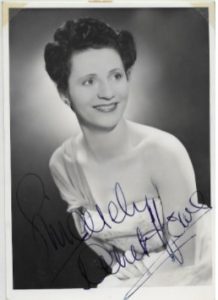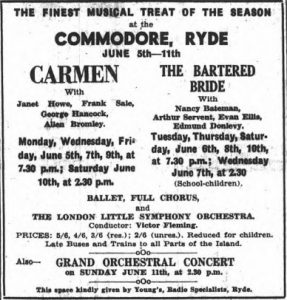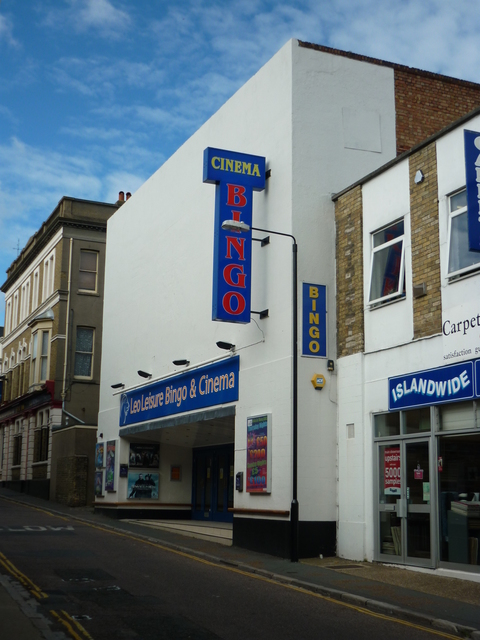“Carmen” and “The Bartered Bride”
Samuel Johnson once said that “Few things are impossible to diligence and skill,” and that has been notably demonstrated by the I.W. Grand Opera Company, who during the week, 5th till 11th June 1950, had staged for the Island’s first opera week at the Commodore Theatre, Ryde, Bizet’s “Carmen” and Smetana’s “The Bartered Bride.” The productions were a defiant reply to local “Doubting Thomases” in that the company, formed only in the February, had covered their expenses, although public response, possibly due to the heat-wave or inhibition, was not encouraging at the beginning of the week, but bookings increased as it progressed.

Janet Howe, Contralto
Leading operatic singers took the principal roles and the other solo parts and chorus were creditably provided by the local talent. The visiting artists were Janet Howe and her husband, George Hancock, of the Royal Opera House, Covent Garden, Edmund Donlevy, of the Sadlers Wells Opera Company, Arthur Servent, formerly of Sadlers Wells, Nancy Bateman and her brother Evan Ellis, late of the Welsh National Opera Company, and Allen Bromley, formerly of the Midland Opera Company.
As the company had had only 40 hours’ rehearsal for both operas and the opening night was the first occasion on which they had been accompanied by the orchestra, they gave a remarkably polished performance. Janet Howe was described after her 100th performance of the part the previous year, as the very epitome of all that Bizet intended Carmen to be. She had all Spain in her dark beauty, and the rich melodic quality of her contralto voice was only equalled by her deep dramatic feeling. Her mastery of the castanets was also impressive. All of this was in spite of a mild attack of laryngitis, brought on by the unaccustomed Island air.
The chorus of dragoons, smugglers, and senoritas acquitted themselves admirably and members of the Ryde Buccaneers assisted in the crowd scenes.
The director and producer was Mr. Victor Fleming, of Ventnor, to whose untiring work the company’s success was very largely due, and in the Island opera week he had achieved the beginnings of his ambition to bring first-class opera to the provinces. The newly-formed London’s Little Symphony Orchestra contributed greatly to the success of the venture by their admirably played overtures and accompaniments, and on Sunday the orchestra gave a concert of well known works at the Commodore.
 A matinee of “The Bartered Bride” was given on Wednesday to over 1000 school-children from all parts of the Island and the week concluded on Saturday 11th with a matinee of “Carmen” and an evening performance of “The Bartered Bride.”
A matinee of “The Bartered Bride” was given on Wednesday to over 1000 school-children from all parts of the Island and the week concluded on Saturday 11th with a matinee of “Carmen” and an evening performance of “The Bartered Bride.”
Credit was due to the unflagging efforts of Mr. A. J. Mornard (chairman), Mrs. B. M. Morris (hon. secretary), and the committee, assisted by Mr. C. P. B. South (stage manager), Mr. L. Thompson (assistant stage manager), Miss B. Major (choreographer), and Mrs. E. R. Latham (wardrobe mistress).
The programme acknowledged the company’s indebtedness to its honorary accompanist (Mr. Michael Wallis, a skilful young local pianist), and the members of the A.T.C. band who appeared in the circus scene in “The Bartered Bride.”
Sources: RSHG Archive, IW County Press
Images: Peter Rickard and RSHG Archive
Article: Ann Barrett

